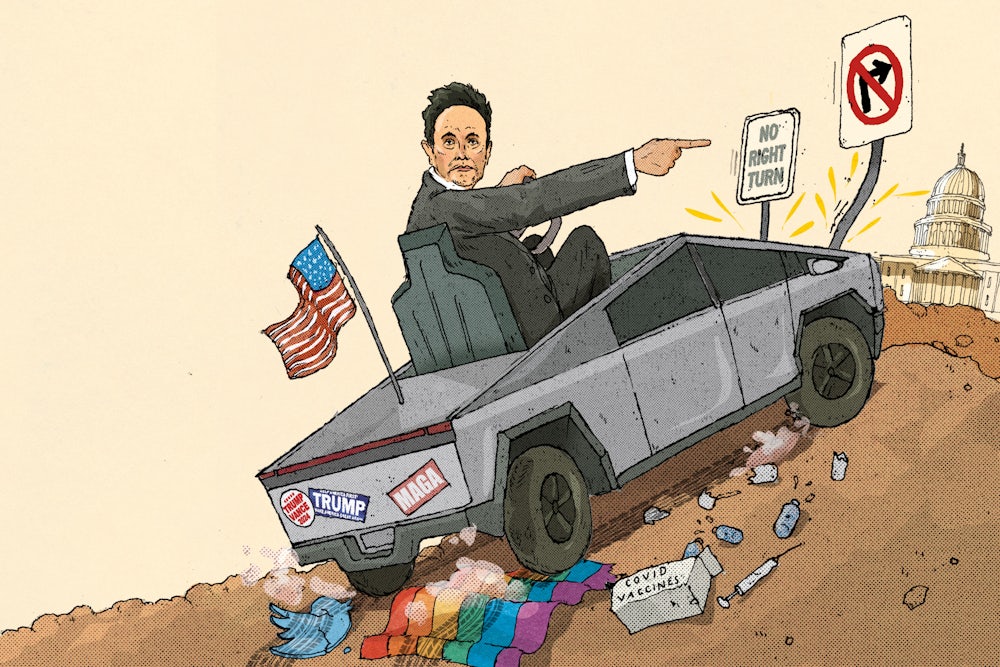Four years ago, Elon Musk sounded, at least in public, like a lot of other rich-guy CEOs. Avoiding taking sides in the presidential election, he maxed out donations to a handful of elected Republicans and Democrats but put nothing toward the presidential race. On a New York Times podcast that aired that fall, Musk said that he was undecided about who he’d vote for. He spent part of Election Day 2020 reminiscing about the good old days when Tesla, then a small startup, teetered on the brink of bankruptcy. Musk was so politically indifferent that, as far as I could tell, he didn’t mention Joe Biden in a tweet at any point that year, and he tweeted once at President Donald Trump to thank him for calling for California Governor Gavin Newsom to remove mask mandates. When election deniers rioted at the Capitol on January 6, 2021, Musk shared a couple of jokes about the QAnon shaman, and that was about it. (Like many people, Musk does occasionally delete some of his posts.)
Indeed, during that fraught time, you might have found relief in Musk’s goofy Twitter timeline, where he nerded out about engine torque, the scientific mechanics of Covid-19 tests, or his favorite video games. He embraced his fans’ impression of him as a superhero—specifically Tony Stark, a.k.a. Iron Man, a rich inventor and arms dealer with a goofy, populist touch. (Musk had a cameo in Iron Man 2.) Every year, Musk liked to tout Tesla’s perfect score on Human Rights Campaign’s measure of LGBTQ equality. “Don’t buy our car if that’s a problem,” he tweeted in 2018. “People should be free to live their lives where their heart takes them.” He followed it with a string of colorful heart emojis.
But Musk hasn’t made a declaration like that in two years. Instead, he’s become the most high-profile example of a dramatic and public rightward political shift among top tech executives and venture capitalists, and his persona has utterly transformed into a grotesque amalgam of Howard Roark and Howard Hughes. Many times per day—and often deep into the night—Musk posts dark fantasies on Twitter (which he purchased in 2022 and has rechristened X) about invading migrants, trans people, and the infamous “woke mind virus” that he claims is a threat to human civilization. In real life, Musk is surrounded by angry ex-wives and a passel of bizarrely named children; online, he has all the sycophants he could want. And in Donald Trump, whom he has now endorsed, and whose campaign he has reportedly pledged to support to the tune of $45 million per month, he’s found the ultimate vehicle for his resentments. (Without offering details, Musk has claimed that the reporting on his political donations is wrong.)
Musk is not alone. He’s been joined by a raft of tech executives, venture capitalists, Wall Street financiers, and other cantankerous members of the business overclass who together reflect a political realignment that first emerged during the Trump presidency. David Sacks, a venture capitalist and, like Musk, a PayPal alumnus, is a longtime conservative who has become vocally, bitterly anti-Democratic, his ascendancy to the top of the tech-MAGA hierarchy symbolized by a stilted speech he delivered at this year’s Republican National Convention. Shaun Maguire, a partner at Sequoia Capital, announced a $300,000 donation to Trump in May, and has been stumping hard for the ex-president on X. And this past summer, tech billionaires Marc Andreessen and Ben Horowitz offered their support for Trump on their podcast, citing Biden’s proposed tax on unrealized capital gains.
Of course, conservative political beliefs have long been common among the ultrarich. The tech elite once limited themselves mostly to preaching crypto, artificial intelligence, and life extension to a public that mostly wants messaging apps, free health care, and cheap rent. But now, they seem to be possessed by a grievance-driven groupthink, intolerant of criticism. Living the cloistered, easy lives of the Burning Man set, microdosing on ego worship, this authoritarian-curious crew has helped frame the online discourse around—and lead the backlash against—criminal justice reform, urban homelessness, immigration policies, and transgender rights.
With his overwhelming wealth and media ubiquity, Musk is the most public face of the radicalization of America’s billionaire class. Last November, in response to an antisemitic tweet describing the great replacement theory, which posits that liberals and Jews are helping to bring in illegal migrants to tilt the voting rolls Democratic, Musk wrote, “You have said the actual truth.” Once a fringe belief that inspired racist violence, this false conspiracy theory is now trumpeted by some of the country’s most prominent Republicans.
Meanwhile, David Sacks has denounced “Soros DAs,” and helped fund the recall of San Francisco District Attorney Chesa Boudin, a high-profile reform advocate. The Cicero Institute, an activist think tank started by Palantir co-founder Joe Lonsdale, has influenced anti-camping legislation targeting unhoused people in numerous states. And of course there is Peter Thiel, the democracy skeptic who has previously backed Trump but has declined to donate this cycle. (The presidential candidate Musk supports—if we need a reminder—tried to overturn the results of the last election.)
There’s something recognizable in this bitter reactionary swerve. In a post-pandemic era of political stagnation and runaway inequality, many people are mad, dissatisfied, and alienated, even those who are materially comfortable. But the resentments of these men come with a determination to act and the means to do so, with little apparent concern for the consequences.
To understand the feckless self-confidence of the nouveau elite, it’s perhaps instructive to remember the conditions under which many of them first made their billions. The Federal Reserve’s post–Great Recession zero interest rate policy, or ZIRP, minted numerous millionaires and billionaires in tech and finance whose companies produced little in the way of public value or long-term viability. Buoyed by the gains of cheap capital, government contracts and subsidies, and a rising stock market, this new generation of the ultrarich convinced themselves of their exceptionalism. And if you are among the richest of those elites—say, a centi-billionaire of increasingly dubious mental stability—you might decide that you are the one to save humanity from existential risk. “Our whole civilization is at stake,” Musk posted on X in February, regarding a scandal over Google’s generative image AI miscasting white historical figures as nonwhite. “The woke mind virus is killing Western Civilization.”
Musk’s fear of a “woke mind virus” initially seemed like some kind of dorm-room joke, but his obsession with it appears real and personal. In July, he told the kooky Canadian psychologist-turned-right-wing influencer Jordan Peterson that the “virus” had killed his child. But that child isn’t dead: She is living happily as a transgender woman and has said she wants nothing to do with Musk, who bullied her for being queer. Her biological father, meanwhile, boosts hate-mongering accounts like LibsOfTikTok and regularly promotes transphobic material. When California recently passed a law protecting the privacy of trans kids, Musk vowed to move his companies to Texas.
Apart from personal grievances, what seems to unite uber-wealthy reactionaries is a perceived loss of control. They resented Covid-19 quarantine restrictions, which they saw as another deep state power grab and impingement on personal liberty, rather than a bumbling, if mostly good faith, effort by politicians and bureaucrats to prevent more people from dying. In time, this anger molted into an antisocial worldview that sees baroque conspiracies around every corner—in Black Lives Matter protests; in college encampments built in support of Gaza; in diversity, equity, and inclusion initiatives. Billionaires who once claimed to identify as socially liberal saw a form of progressive politics that they didn’t recognize.
Their histrionics are everywhere online; rhetorical nuance, not so much. Keith Rabois, another former PayPal executive, has blamed DEI for everything from the near-assassination of Donald Trump to Harvard students protesting against Israel, while hedge-funder (and lapsed Democratic donor) Bill Ackman is prone to publishing multi-thousand-word laments about the state of the Ivy League and the media’s coverage of his wife’s alleged plagiarism. Meanwhile, Musk’s lack of discernment—his willingness to repost many thinly sourced rumors that flatter his bigotries—has been staggering for someone so supposedly brilliant. For instance: Violent crime has largely declined in America’s urban centers in recent years, but that has not stopped Musk from embracing hysterical propaganda about violent progressive-run cities. And along with his friend Sacks, who backed Florida Governor Ron DeSantis for president before ultimately settling on Trump, Musk posts frequently about the supposed apocalyptic damage being wrought on the country by immigration.
These billionaires are not just talking to themselves, or to one another. In full public view, Musk and many of his peers on X engage with the same Nazis and boutique far-right subcultures—incel-worshipping groypers, misogynist gamers, ultra-libertarian techies—that produce a reliable supply of mass shooters and Republican politicians. They post far-right memes, promote propagandistic documentaries, and go on podcasts that cater to the same black-pilled audience. They advocate the same reactionary ideas around DEI programs, climate change, and social justice. This is the sinister petri dish that spawned J.D. Vance, who was Thiel’s disciple before he threw himself into politics.
Musk’s political arc may seem like the most sudden and dramatic of his cohort, but his reactionary tilt was formed by events well before he bought Twitter. What really sent him and his colleagues over the edge was the end of the free-money era: In 2022, the Fed started raising interest rates, and the crypto industry, which had been anchored by multibillion-dollar frauds like FTX and Terra, crashed. As the flood of easy money that had tempered the worst of the Covid-19 economic decline turned into a trickle, the economy became less forgiving to entrepreneurs risking vast quantities of other people’s money on speculative bets. The change could be seen in the seven months in 2022 between when Musk agreed to buy Twitter—and then tried to back out—and when he was sued into consummating the deal. The Federal Reserve raised interest rates four times during that period while Twitter’s stock price fluctuated, making the deal far riskier for Musk (and his lenders) by the time he finally acceded to it. What started as a very expensive troll became a $44 billion albatross.
Yet, however steep the cost to his bankbook and reputation, the acquisition of X made Musk a far more powerful political operator than he was before. He and his network changed Trump’s mind about Bitcoin, TikTok, and AI regulation, and got one of their own on the presidential ticket, as they poured millions into Republican campaign coffers. In August, Trump even deigned to join a livestream with Musk on X as he sought to course-correct his flailing campaign. During the two-hour conversation, Trump congratulated Musk on his willingness to fire employees who demand better working conditions. Musk, meanwhile, said he’d be happy to help a Trump administration look at ways to cut government spending. (X has reportedly laid off roughly 80 percent of its workforce since Musk took over.)
For Musk, the real cost of his buying Twitter was surrendering his ability to rationally cogitate as he sinks into a fever swamp of bigotry and conspiracy. One week, Christianity is imperiled by the Olympics opening ceremony, and the next, we’re told that “Kamala is quite literally a communist.” None of it is true. It’s also possible that Musk doesn’t care what’s true. When he posts that England is descending into civil war—as he did after a couple of days of recent anti-migrant violence that was turned back by anti-fascist protesters—it can sound like wish-casting.
This roving, schizophrenic style of thinking is useless for politics or governance. But if your goal is to provoke attention, to throw a grenade in the sclerotic political system, to inspire hatred toward trans people and other cultural enemies, to make an alliance with a MAGA movement that knows only the politics of chaos—well, then it’s everything.




